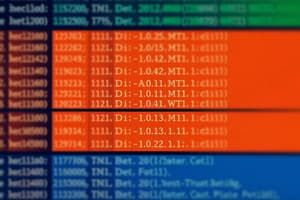Podcast
Questions and Answers
What is one of the benefits of using an array in C programming?
What is one of the benefits of using an array in C programming?
- Arrays can dynamically change size during execution.
- Arrays require more code to access data.
- Arrays store elements of different data types.
- Arrays allow easy random access to elements. (correct)
Which statement correctly describes the storage of array elements in C?
Which statement correctly describes the storage of array elements in C?
- Array elements are stored in a linked format.
- Array elements are stored at random memory locations.
- Array elements can be of different sizes.
- Array elements are stored at contiguous memory locations. (correct)
What is a limitation of arrays in C?
What is a limitation of arrays in C?
- They can store complex data types.
- They support dynamic memory allocation.
- They cannot exceed the predefined size. (correct)
- They require less memory than linked lists.
Which of the following properties of arrays facilitates their declaration?
Which of the following properties of arrays facilitates their declaration?
How does code optimization occur when using arrays?
How does code optimization occur when using arrays?
What is an advantage of using a for loop with arrays?
What is an advantage of using a for loop with arrays?
Which types of data can be stored in a C array?
Which types of data can be stored in a C array?
What is a correct way to declare an integer array in C?
What is a correct way to declare an integer array in C?
How do arrays in C allow for random access of elements?
How do arrays in C allow for random access of elements?
What is the memory storage characteristic of elements within a C array?
What is the memory storage characteristic of elements within a C array?
Describe one advantage and one disadvantage of using arrays in C programming.
Describe one advantage and one disadvantage of using arrays in C programming.
Why is it beneficial to use a for loop for traversing elements in an array?
Why is it beneficial to use a for loop for traversing elements in an array?
What types of data can be stored in a C array?
What types of data can be stored in a C array?
How does the fixed size of arrays affect their usability compared to dynamic data structures?
How does the fixed size of arrays affect their usability compared to dynamic data structures?
Explain why code optimization is achieved when using arrays.
Explain why code optimization is achieved when using arrays.
What is meant by the term 'derived data types' in the context of C arrays?
What is meant by the term 'derived data types' in the context of C arrays?
Flashcards are hidden until you start studying
Study Notes
C Array
- An array is a collection of similar data types stored at contiguous memory locations
- Arrays are a derived data type in C, able to hold primitive data types like
int,char,double,float - Arrays can also store derived data types such as pointers and structures
- All elements of an array can be accessed randomly by using their index number
- Arrays are beneficial when storing similar elements
- Example: storing a student's marks across multiple subjects
Properties of Arrays
- All elements of an array share the same data type and size
- Example:
intis 4 bytes
- Example:
- Array elements are stored in contiguous memory locations, with the first element at the lowest memory address
- Array elements can be randomly accessed because the address of each element can be calculated using the base address and the size of the data element
Advantages of C Arrays
- Code Optimization: Less code is needed to access data
- Ease of Traversing: Arrays can be traversed easily using a
forloop - Ease of Sorting: Sorting an array requires a few lines of code
- Random Access: Any element can be accessed randomly using its index
Disadvantages of C Arrays
- Fixed Size: Arrays are statically sized, meaning the size cannot be changed after declaration
- This is different from dynamic data structures like linked lists, which can grow as needed
Declaration of C Array
- The following syntax can be used to declare an array in the C language
-
data_type array_name[size]; -
Example:
int marks[5];- This declares an integer array namedmarkswith a size of 5
-
C Array
- An array is a collection of similar data types stored in contiguous memory locations.
- Arrays can store primitive data types (int, char, double, float) and derived data types (pointers, structures).
- Each element in the array can be accessed randomly using its index number.
- Arrays are beneficial when storing similar elements, such as student marks in different subjects.
Properties of C Array
- All elements in an array have the same data type and size.
- Elements are stored consecutively in memory, starting at the lowest memory location.
- Elements can be accessed randomly because the address of each element can be calculated from the base address and the size of the data type.
Advantages of C Array
- Code Optimization: Accessing data requires less code.
- Ease of Traversing: Retrieving array elements is simple using a for loop.
- Ease of Sorting: Sorting array elements requires minimal code.
- Random Access: Any element can be accessed directly using its index.
Disadvantage of C Array
- Fixed Size: The declared size of an array cannot be exceeded.
- Unlike linked lists, arrays cannot dynamically grow in size.
Declaration of C Array
- Arrays in C are declared using syntax like:
data_type array_name[array_size];
- For example, to declare an array named
marksto store 6 integer values, you would use:
int marks[6];
Studying That Suits You
Use AI to generate personalized quizzes and flashcards to suit your learning preferences.




